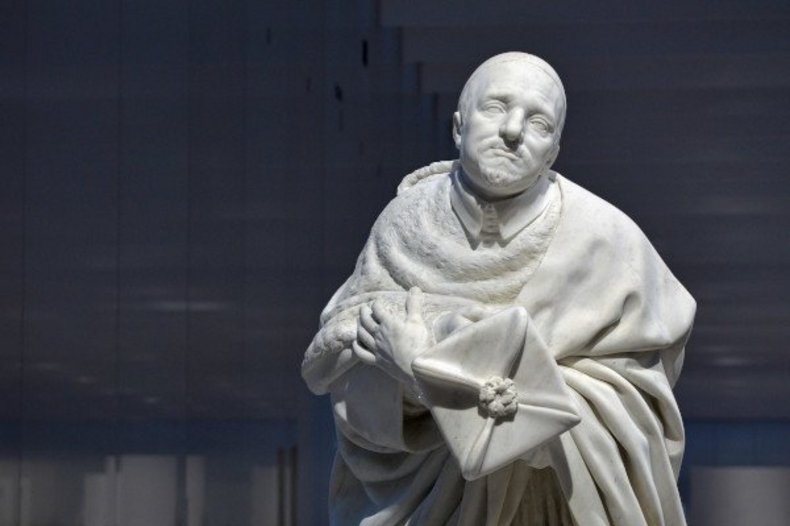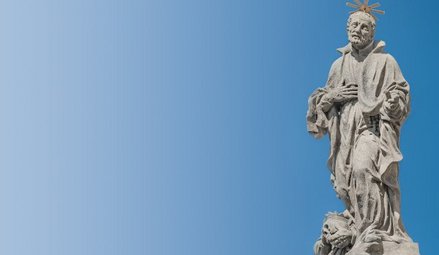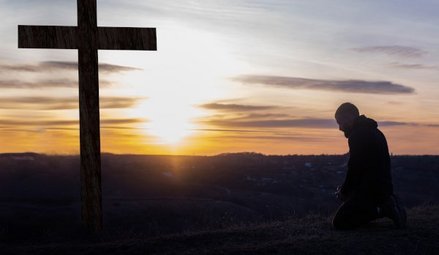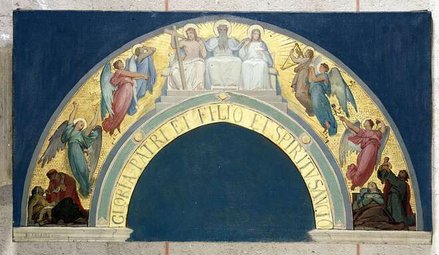- By theme
- Jesus
- The many proofs of Christ’s resurrection
- Saint Thomas Aquinas: God gave all the divine proofs we needed to believe
- The surpassing power of Christ's word
- Lewis’s trilemma: a proof of Jesus’s divinity
- God saves: the power of the holy name of Jesus
- Jesus spoke and acted as God's equal
- Jesus' divinity is actually implied in the Koran
- Jesus came at the perfect time of history
- Rabbinical sources testify to Jesus' miracles
- Mary
- The Church
- The Bible
- The authors of the Gospels were either eyewitnesses or close contacts of those eyewitnesses
- Onomastics support the historical reliability of the Gospels
- The New Testament was not altered
- The New Testament is the best-attested manuscript of Antiquity
- The Gospels were written too early after the facts to be legends
- Archaeological finds confirm the reliability of the New Testament
- The criterion of embarrassment proves that the Gospels tell the truth
- The dissimilarity criterion strengthens the case for the historical reliability of the Gospels
- 84 details in Acts verified by historical and archaeological sources
- The unique prophecies that announced the Messiah
- The time of the coming of the Messiah was accurately prophesied
- The prophet Isaiah's ultra accurate description of the Messiah's sufferings
- Daniel's "Son of Man" is a portrait of Christ
- The Apostles
- The martyrs
- The protomartyr Saint Stephen (d. 31)
- Polycarp, bishop of Smyrna, disciple of John and martyr (d. 155)
- Saint Blandina and the Martyrs of Lyon: the fortitude of faith (177 AD)
- Saint Agatha stops a volcano from destroying the city of Catania (d. 251)
- Saint Lucy of Syracuse, virgin and martyr for Christ (d. 304)
- Thomas More: “The king’s good servant, but God’s first”
- The martyrdom of Paul Miki and his companions (d. 1597)
- The martyrs of Angers and Avrillé (1794)
- The Martyrs of Compiègne (1794)
- The Vietnamese martyrs Father Andrew Dung-Lac and his 116 companions (17th-19th centuries)
- He braved torture to atone for his apostasy (d. 1818)
- Blaise Marmoiton: the epic journey of a missionary to New Caledonia (d. 1847)
- José Luis Sanchez del Rio, martyred at age 14 for Christ the King (d. 1928)
- Saint Maximilian Kolbe, Knight of the Immaculate (d. 1941)
- The monks
- The Desert Fathers (3rd century)
- Saint Anthony of the Desert, a father of monasticism (d. 356)
- Saint Benedict, father of Western monasticism (d. 550)
- Saint Bruno the Carthusian (d.1101): the miracle of a hidden life
- Blessed Angelo Agostini Mazzinghi: the Carmelite with flowers pouring from his mouth (d. 1438)
- Monk Abel of Valaam's accurate prophecies about Russia (d. 1841)
- The more than 33,000 miracles of Saint Charbel Maklouf (d. 1898)
- Saint Pio of Pietrelcina (d. 1968): How God worked wonders through "a poor brother who prays"
- The surprising death of Father Emmanuel de Floris (d. 1992)
- The prophecies of Saint Paisios of Mount Athos (d. 1994)
- The saints
- Saints Anne and Joachim, parents of the Virgin Mary (19 BC)
- Saint Nazarius, apostle and martyr (d. 68 or 70)
- Ignatius of Antioch: successor of the apostles and witness to the Gospel (d. 117)
- Saint Gregory the Miracle-Worker (d. 270)
- Saint Martin of Tours: patron saint of France, father of monasticism in Gaul, and the first great leader of Western monasticism (d. 397)
- Saint Lupus, the bishop who saved his city from the Huns (d. 623)
- Saint Dominic of Guzman (d.1221): an athlete of the faith
- Saint Francis, the poor man of Assisi (d. 1226)
- Saint Anthony of Padua: "everyone’s saint"
- Saint Rose of Viterbo or How prayer can transform the world (d. 1252)
- Saint Simon Stock receives the scapular of Mount Carmel from the hands of the Virgin Mary
- The unusual boat of Saint Basil of Ryazan
- Saint Agnes of Montepulciano's complete God-confidence (d. 1317)
- The extraordinary conversion of Michelina of Pesaro
- Saint Peter Thomas (d. 1366): a steadfast trust in the Virgin Mary
- Saint Rita of Cascia: hoping against all hope
- Saint Catherine of Genoa and the Fire of God's love (d. 1510)
- Saint Anthony Mary Zaccaria, physician of bodies and souls (d. 1539)
- Saint Ignatius of Loyola (d. 1556): "For the greater glory of God"
- Brother Alphonsus Rodríguez, SJ: the "holy porter" (d. 1617)
- Martin de Porres returns to speed up his beatification (d. 1639)
- Virginia Centurione Bracelli: When God is the only goal, all difficulties are overcome (d.1651)
- Saint Marie of the Incarnation, "the Teresa of New France" (d.1672)
- Rosa Venerini: moving in the ocean of the Will of God (d. 1728)
- Seraphim of Sarov (1759-1833): the purpose of the Christian life is to acquire the Holy Spirit
- Bernadette Soubirous, the shepherdess who saw the Virgin Mary (1858)
- Saint John Vianney (d. 1859): the global fame of a humble village priest
- Gabriel of Our Lady of Sorrows, the "Gardener of the Blessed Virgin" (d. 1862)
- Father Gerin, the holy priest of Grenoble (1863)
- Blessed Francisco Palau y Quer: a lover of the Church (d. 1872)
- Saints Louis and Zelie Martin, the parents of Saint Therese of Lisieux (d. 1894 and 1877)
- The supernatural maturity of Francisco Marto, “contemplative consoler of God” (d. 1919)
- Saint Faustina, apostle of the Divine Mercy (d. 1938)
- Brother Marcel Van (d.19659): a "star has risen in the East"
- Doctors
- The mystics
- Lutgardis of Tongeren and the devotion to the Sacred Heart
- Saint Angela of Foligno (d. 1309) and "Lady Poverty"
- Saint John of the Cross: mystic, reformer, poet, and universal psychologist (+1591)
- Blessed Anne of Jesus: a Carmelite nun with mystical gifts (d.1621)
- Catherine Daniélou: a mystical bride of Christ in Brittany
- Saint Margaret Mary sees the "Heart that so loved mankind"
- Mother Yvonne-Aimée of Jesus' predictions concerning the Second World War (1922)
- Sister Josefa Menendez, apostle of divine mercy (d. 1923)
- Edith Royer (d. 1924) and the Sacred Heart Basilica of Montmartre
- Rozalia Celak, a mystic with a very special mission (d. 1944)
- Visionaries
- Saint Perpetua delivers her brother from Purgatory (203)
- María de Jesús de Ágreda, abbess and friend of the King of Spain
- Discovery of the Virgin Mary's house in Ephesus (1891)
- Sister Benigna Consolata: the "Little Secretary of Merciful Love" (d. 1916)
- Maria Valtorta's visions match data from the Israel Meteorological Service (1943)
- Berthe Petit's prophecies about the two world wars (d. 1943)
- Maria Valtorta saw only one pyramid at Giza in her visions... and she was right! (1944)
- The 700 extraordinary visions of the Gospel received by Maria Valtorta (d. 1961)
- The amazing geological accuracy of Maria Valtorta's writings (d. 1961)
- Maria Valtorta's astronomic observations consistent with her dating system
- Discovery of an ancient princely house in Jerusalem, previously revealed to a mystic (d. 1961)
- The popes
- The great witnesses of the faith
- Saint Augustine's conversion: "Why not this very hour make an end to my uncleanness?" (386)
- Thomas Cajetan (d. 1534): a life in service of the truth
- Madame Acarie, "the servant of the servants of God" (d. 1618)
- Blaise Pascal (d.1662): Biblical prophecies are evidence
- Jacinta, 10, offers her suffering to save souls from hell (d. 1920)
- Father Jean-Édouard Lamy: "another Curé of Ars" (d. 1931)
- Christian civilisation
- The depth of Christian spirituality
- John of the Cross' Path to perfect union with God based on his own experience
- The dogma of the Trinity: an increasingly better understood truth
- The incoherent arguments against Christianity
- The "New Pentecost": modern day, spectacular outpouring of the Holy Spirit
- The Christian faith explains the diversity of religions
- Cardinal Pierre de Bérulle (d.1629) on the mystery of the Incarnation
- Christ's interventions in history
- Marian apparitions and interventions
- The Life-giving Font of Constantinople
- Our Lady of Virtues saves the city of Rennes in Bretagne (1357)
- Mary stops the plague epidemic at Mount Berico (1426)
- Cotignac: the first apparitions of the Modern Era (1519)
- Savona: supernatural origin of the devotion to Our Lady of Mercy (1536)
- The Virgin Mary delivers besieged Christians in Cusco, Peru
- The victory of Lepanto and the feast of Our Lady of the Rosary (1571)
- The apparitions to Brother Fiacre (1637)
- The “aldermen's vow”, or the Marian devotion of the people of Lyon (1643)
- Our Lady of Nazareth in Plancoët, Brittany (1644)
- Our Lady of Laghet (1652)
- Saint Joseph’s apparitions in Cotignac, France (1660)
- Heaven confides in a shepherdess of Le Laus (1664-1718)
- Zeitoun, a two-year miracle (1968-1970)
- The Holy Name of Mary and the major victory of Vienna (1683)
- Heaven and earth meet in Colombia: the Las Lajas shrine (1754)
- A series of Marian apparitions and prophetic messages in Ukraine since the 19th century (1806)
- "Consecrate your parish to the Immaculate Heart of Mary" (1836)
- At La Salette, Mary wept in front of the shepherds (1846)
- Our Lady of Champion, Wisconsin: the first and only approved apparition of Mary in the US (1859)
- Gietrzwald apparitions: heavenly help to a persecuted minority
- The silent apparition of Knock Mhuire in Ireland (1879)
- Mary "Abandoned Mother" appears in a working-class district of Lyon, France (1882)
- The thirty-three apparitions of the Virgin Mary in Beauraing (1932)
- "Our Lady of the Poor" appears eight times in Banneux (1933)
- Fontanelle-Montichiari apparitions of Our Lady "Rosa Mystica" (1947)
- Mary responds to the Vows of the Polish Nation (1956)
- Zeitoun apparitions
- The Virgin Mary comes to France's rescue by appearing at L'Ile Bouchard (1947)
- Maria Esperanza Bianchini and Mary, Mary, Reconciler of Peoples and Nations (1976)
- Luz Amparo and the El Escorial apparitions
- The extraordinary apparitions of Medjugorje and their worldwide impact
- The Virgin Mary prophesied the 1994 Rwandan genocide (1981)
- Our Lady of Soufanieh's apparition and messages to Myrna Nazzour (1982)
- The Virgin Mary heals a teenager, then appears to him dozens of times (1986)
- Seuca, Romania: apparitions and pleas of the Virgin Mary, "Queen of Light" (1995)
- Angels and their manifestations
- Mont Saint-Michel: Heaven watching over France
- Angels give a supernatural belt to the chaste Thomas Aquinas (1243)
- The constant presence of demons and angels in the life of St Frances of Rome (d. 1440)
- Mother Yvonne-Aimée escapes from prison with the help of an angel (1943)
- Saved by Angels: The Miracle on Highway 6 (2008)
- Exorcisms in the name of Christ
- A wave of charity unique in the world
- Saint Peter Nolasco: a life dedicated to ransoming enslaved Christians (d. 1245)
- Saint Angela Merici: Christ came to serve, not to be served (d. 1540)
- Saint John of God: a life dedicated to the care of the poor, sick and those with mental disorders (d. 1550)
- Saint Camillus de Lellis, reformer of hospital care (c. 1560)
- Blessed Alix Le Clerc, encouraged by the Virgin Mary to found schools (d. 1622)
- Saint Vincent de Paul (d. 1660), apostle of charity
- Marguerite Bourgeoys, Montreal's first teacher (d. 1700)
- Frédéric Ozanam, inventor of the Church's social doctrine (d. 1853)
- Damian of Molokai: a leper for Christ (d. 1889)
- Pier Giorgio Frassati (d.1925): heroic charity
- Saint Dulce of the Poor, the Good Angel of Bahia (d. 1992)
- Mother Teresa of Calcutta (d. 1997): an unshakeable faith
- Heidi Baker: Bringing God's love to the poor and forgotten of the world
- Amazing miracles
- The miracle of liquefaction of the blood of St. Januarius (d. 431)
- The miracles of Saint Anthony of Padua (d. 1231)
- Saint Pius V and the miracle of the Crucifix (1565)
- Saint Philip Neri calls a teenager back to life (1583)
- The resurrection of Jérôme Genin (1623)
- Saint Francis de Sales brings back to life a victim of drowning (1623)
- Saint John Bosco and the promise kept beyond the grave (1839)
- The day the sun danced at Fatima (1917)
- Pius XII and the miracle of the sun at the Vatican (1950)
- When Blessed Charles de Foucauld saved a young carpenter named Charle (2016)
- Reinhard Bonnke: 89 million conversions (d. 2019)
- Miraculous cures
- The royal touch: the divine thaumaturgic gift granted to French and English monarchs (11th-19th centuries)
- With 7,500 cases of unexplained cures, Lourdes is unique in the world (1858-today)
- Our Lady at Pellevoisin: "I am all merciful" (1876)
- Mariam, the "little thing of Jesus": a saint from East to West (d.1878)
- Gemma Galgani: healed to atone for sinners' faults (d. 1903)
- The miraculous cure of Blessed Maria Giuseppina Catanea
- The extraordinary healing of Alice Benlian in the Church of the Holy Cross in Damascus (1983)
- The approved miracle for the canonization of Juan Diego Cuauhtlatoatzin (1990)
- Healed by St Charbel Makhlouf, her scars bleed each month for the benefit of unbelievers (1993)
- The miracle that led to Brother André's canonisation (1999)
- Bruce Van Natta's intestinal regrowth: an irrefutable miracle (2007)
- Manouchak, operated on by Saint Charbel (2016)
- How Maya was cured from cancer at Saint Charbel's tomb (2018)
- Preserved bodies of the saints
- Dying in the odour of sanctity
- The body of Saint Cecilia found incorrupt (d. 230)
- Stanislaus Kostka's burning love for God (d. 1568)
- Blessed Antonio Franco, bishop and defender of the poor (d. 1626)
- The incorrupt body of Marie-Louise Nerbollier, the visionary from Diémoz (d. 1910)
- The great exhumation of Saint Charbel (1950)
- Bilocations
- Inedias
- Levitations
- Lacrimations and miraculous images
- Saint Juan Diego's tilma (1531)
- The Rue du Bac apparitions of the Virgin Mary to St. Catherine Labouré (Paris, 1830)
- Mary weeps in Syracuse (1953)
- Teresa Musco (d.1976): salvation through the Cross
- Soufanieh: A flow of oil from an image of the Virgin Mary, and oozing of oil from the face and hands of Myrna Nazzour (1982)
- The Saidnaya icon exudes a wonderful fragrance (1988)
- Our Lady weeps in a bishop's hands (1995)
- Stigmates
- The venerable Lukarda of Oberweimar shares her spiritual riches with her convent (d. 1309)
- Blessed Maria Grazia Tarallo, mystic and stigmatist (d. 1912)
- Saint Padre Pio: crucified by Love (1918)
- Elena Aiello: "a Eucharistic soul"
- A Holy Triduum with a Syrian mystic, witnessing the sufferings of Christ (1987)
- A Holy Thursday in Soufanieh (2004)
- Eucharistic miracles
- Lanciano: the first and possibly the greatest Eucharistic miracle (750)
- A host came to her: 11-year-old Imelda received Communion and died in ecstasy (1333)
- Faverney's hosts miraculously saved from fire
- A tsunami recedes before the Blessed Sacrament (1906)
- Buenos Aires miraculous host sent to forensic lab, found to be heart muscle (1996)
- Relics
- The Veil of Veronica, known as the Manoppello Image
- For centuries, the Shroud of Turin was the only negative image in the world
- The Holy Tunic of Argenteuil's fascinating history
- Saint Louis (d. 1270) and the relics of the Passion
- The miraculous rescue of the Shroud of Turin (1997)
- A comparative study of the blood present in Christ's relics
- Jews discover the Messiah
- Francis Xavier Samson Libermann, Jewish convert to Catholicism (1824)
- Our Lady of the Miraculous Medal and the conversion of Alphonse Ratisbonne (1842)
- Max Jacob: a liberal gay Jewish artist converts to Catholicism (1909)
- Edith Stein - Saint Benedicta of the Cross: "A daughter of Israel who, during the Nazi persecutions, remained united with faith and love to the Crucified Lord, Jesus Christ, as a Catholic, and to her people as a Jew"
- Patrick Elcabache: a Jew discovers the Messiah after his mother is miraculously cured in the name of Jesus
- Cardinal Aron Jean-Marie Lustiger (d. 2007): Chosen by God
- Muslim conversions
- Buddhist conversions
- Atheist conversions
- The conversion of an executioner during the Terror (1830)
- God woos a poet's heart: the story of Paul Claudel's conversion (1886)
- Dazzled by God: Madeleine Delbrêl's story (1924)
- C.S. Lewis, the reluctant convert (1931)
- The day André Frossard met Christ in Paris (1935)
- MC Solaar's rapper converts after experiencing Jesus' pains on the cross
- Father Sébastien Brière, converted at Medjugorje (2003)
- Franca Sozzani, the "Pope of fashion" who wanted to meet the Pope (2016)
- Nelly Gillant: from Reiki Master to Disciple of Christ (2018)
- Testimonies of encounters with Christ
- Near-death experiences (NDEs) confirm Catholic doctrine on the Four Last Things
- The NDE of Saint Christina the Astonishing, a source of conversion to Christ (1170)
- Jesus audibly calls Alphonsus Liguori to follow him (1723)
- Blessed Dina Bélanger (d. 1929): loving God and letting Jesus and Mary do their job
- Gabrielle Bossis: He and I
- André Levet's conversion in prison
- Journey between heaven and hell: a "near-death experience" (1971)
- Alicja Lenczewska: conversations with Jesus (1985)
- Vassula Ryden and the "True Life in God" (1985)
- Nahed Mahmoud Metwalli: from persecutor to persecuted (1987)
- The Bible verse that converted a young Algerian named Elie (2000)
- Invited to the celestial court: the story of Chantal (2017)
- Providential stories
- The superhuman intuition of Saint Pachomius the Great
- Germanus of Auxerre's prophecy about Saint Genevieve's future mission, and protection of the young woman (446)
- Seven golden stars reveal the future location of the Grande Chartreuse Monastery (1132)
- The supernatural reconciliation of the Duke of Aquitaine (1134)
- Saint Zita and the miracle of the cloak (13th c.)
- Joan of Arc: "the most beautiful story in the world"
- John of Capistrano saves the Church and Europe (1456)
- A celestial music comforts Elisabetta Picenardi on her deathbed (d. 1468)
- Gury of Kazan: freed from his prison by a "great light" (1520)
- The strange adventure of Yves Nicolazic (1623)
- Julien Maunoir miraculously learns Breton (1626)
- Pierre de Keriolet: with Mary, one cannot be lost (1636)
- How Korea evangelized itself (18th century)
- The prophetic poem about John Paul II (1840)
- Don Bosco's angel dog: Grigio (1854)
- Thérèse of Lisieux saved countless soldiers during the Great War
- Lost for over a century, a Russian icon reappears (1930)
- In 1947, a rosary crusade liberated Austria from the Soviets (1946-1955)
- The discovery of the tomb of Saint Peter in Rome (1949)
- He should have died of hypothermia in Soviet jails (1972)
- God protects a secret agent (1975)
- Flowing lava stops at church doors (1977)
- A protective hand saved John Paul II and led to happy consequences (1981)
- Mary Undoer of Knots: Pope Francis' gift to the world (1986)
- Edmond Fricoteaux's providential discovery of the statue of Our Lady of France (1988)
- The Virgin Mary frees a Vietnamese bishop from prison (1988)
- The miracles of Saint Juliana of Nicomedia (1994)
- Global launch of "Pilgrim Virgins" was made possible by God's Providence (1996)
- Syrian Monastery shielded from danger multiple times (2011-2020)
- Jesus
- Who are we?
- Make a donation
TOUTES LES RAISONS DE CROIRE
La profondeur de la spiritualité chrétienne
n°133
France
1575-1629
Cardinal Pierre de Bérulle on the mystery of the Incarnation
Secular historians often present Cardinal Pierre de Bérulle as merely a statesman, obscuring or minimising the essence of his life, which was his faith in Christ and his service of Christ's Catholic Church. Through high offices and honours, Bérulle was above all a servant of God, from whom he drew his energy, his literary talent and his mystical insights. The founder of the French school of spirituality, Pierre de Bérulle placed Christ at the centre of everything, with the idea that the Church's mission consisted "being Christ on earth" and continuing his Incarnation here and now. Pope Urban VIII called him the "apostle of the Incarnate Word". Bérulle died while celebrating mass on October 2, 1629.

Cenotaph of Pierre de Bérulle, Musée du Louvre / © CC BY-SA 4.0 / Jacques Sarrazin Selbymay
Les raisons d'y croire :
Bérulle's profound reflection on the mystery of the Incarnation highlights the coherence and beauty of a God become man in order to bring salvation. "There, God who is incomprehensible makes himself understood; God who is ineffable makes himself heard; God who is invisible makes himself seen" (Discourses on the State and Grandeurs of Jesus: The Ineffable Union of the Deity with Humanity, 1623; and Life of Jesus, 1629).
Bérulle wanted to serve God in everything. His genuine selflessness was evident throughout his life. When he was ordained a priest, he vowed not to accept any ecclesiastical benefits. He later declined the title of cardinal, and when he was removed from a position of political influence, he let go of his former charge to pursue his quest for "interior abnegation".
- Far from separating his political activities from his faith, he made the latter the sole principle of the former. He never ceased to seek peace at every level: between nations, between social groups and between individuals.
Some of his writings have an undeniable mystical dimension: united to God, Pierre de Bérulle was above all a deeply prayerful and contemplative man. He recounts how, in 1608, a mystical grace came to confirm his intuitions: "I felt that I had to enter into a complete self-forgetfulness and of all states of life. I felt a separation from the world, and a great conversion and adherence to God."
- He helped introduce the Discalced Carmelite nuns of the reform of Teresa of Ávila into France and founded 40 such convents in record time. To implement the reforms demanded by the Council of Trent, he also founded the Society of the Oratory (1611), which counted 60 communities by the time of his death.
- The Berullian legacy (several thousand pages of writing) is immense and groundbreaking: Bérulle was largely responsible for initiating the French school of spirituality, which has left a deep imprint to this day. He counted among his disciples Vincent de Paul and Francis de Sales.
Synthèse :
Pierre de Bérulle was born in the castle of Cérilly, a commune in north-central France (Yonne department in Bourgogne-Franche-Comté) on February 4, 1575, not far from the village of Bérulle (today in the département of Aube). He belonged to a family of distinguished magistrates: his father was a councillor in the Parliament of Paris; his mother was the daughter of a president of the Parliament. A gifted student, he enjoyed his studies, prayer, liturgical ceremonies and the conviviality of his surroundings. It was only natural that he should be sent to study at the Jesuit college in Clermont, a breeding ground for some of the elite of the day. The spirituality of Saint Ignatius of Loyola left an indelible mark on him.
He studied theology at the University of Paris, where he discovered the world of the capital, its realities and intrigues, but also the presence of Christ in the various religious communities, parishes and personalities he came across. It was in Paris that his vocation as a writer was born. How could he truly serve Jesus in the midst of the noise and tumult of human passions? He responded by writing his first text, A Brief Discourse on Interior Abnegation, a title that foreshadowed the rest of his work. Inspired by the Italian mystic Isabella Cristina Berinzaga, this book is important because it already contains Bérulle's favourite theme: the abasement of Jesus in the Incarnation.
It was also in Paris that he discovered the diversity of the religious world of the time. From the Franciscans to the Carthusians, everything interested him, and nothing dulled his curiosity and devotion. Specialists have traced the various spiritual influences in his work, which began to take shape while he resided in Paris, before 1600.
In 1599, after brilliantly completing his studies, he was ordained a priest. This marked the beginning of a period of intense activity. He gave countless lectures, retreats, discussions and readings. He made the mystery of the Incarnation the heart of his spirituality and his lectures. This inner journey culminated in 1622 with the publication of his Discourse on the State and Grandeurs of Jesus, which was to exert a great influence on the disciples of the French school of spirituality, such as Charles de Condren, Jean-Jacques Olier, Saint Jean Eudes and Saint Vincent de Paul.
At the same time, Bérulle's natural gifts, his intelligence and brilliant homilies were noticed by the royal court. Henri IV made him his confessor and asked him to intervene in diplomatic relations with the Protestants. This was the start of a long career in the service of the Kingdom of France, yet he considered himself first and foremost as a Christian and a priest, in the service of the Gospel. After meeting Saint Francis de Sales in 1602, he became even more passionate about the renewal of the Catholic Church brought about by the Council of Trent. In 1604, he helped introduce into France the Discalced Carmelite nuns reformed by Saint Teresa of Avila in Spain in the previous century. It was a first, and a success. He opened their first convent in Paris, in the Faubourg Saint-Jacques, with the help of his cousin, Barbe Acarie, the future Blessed Marie de l'Incarnation, the first French stigmatist. Forty convents were created in just eighteen years.
Bérulle knew perfectly well the realities, values and difficulties of the diocesan clergy. On November 11, 1611, wishing to offer secular priests a spiritual space that could bring them peace and companionship, he founded in Paris the Congregation of the French Oratory, modelled after the Roman Oratory founded by Saint Philip Neri, whose life and work he knew well. But Bérulle's movement was innovative: the priests who became members lived in common and strove "to the perfection of the evangelical life". However, they did not take solemn vows, and remained obedient to their diocesan bishops. Once again, Bérulle aimed to serve Jesus in the human reality of his time, which was the Counter-Reformation, initiated by the fathers of the Council of Trent.
In 1627, he was made cardinal by Pope Urban VIII, but declined the honor, judging himself absolutely unworthy. It was a futile attempt: the Supreme Pontiff ordered him to accept! What's more, Urban VIII asked him to take part in the reform of the Benedictine monks in France.
Bérulle's hope of retiring to a monastic, contemplative life, away from everything but God, was not going to happen. Queen Marie de Médicis appointed him head of her Council - an appointment that did not endear him to everyone. Cardinal de Richelieu was suspicious of his political rise and took umbrage.
But Bérulle wanted to bear witness to his faith even in the most complicated circumstances. He managed to reconcile Marie de Médicis and her son, the young Louis XIII, in an incredible way. This success earned him a new appointment as State Councillor. This was too much for Richelieu, who removed him from power on various pretexts. Bérulle had just lost his place in the machinery of state. But he held no grudge, abandoned himself to providence and continued his spiritual and philosophical pursuits.
In November 1627, he met René Descartes at the Nunciature in Paris. A dialogue began between the two men. The cardinal asked the illustrious philosopher to participate personally in the reform of philosophy, without losing sight of France's essentially Christian religious and cultural horizon. That same year, he published his Elevation to Jesus Christ Regarding St. [Mary] Magdalene, a work of undeniable mystical richness.
Pierre, Cardinal de Bérulle died suddenly while celebrating Mass on October 2, 1629. His greatest accomplishment, in his eyes, was his personal contribution to placing the Incarnation of Christ at the heart of Catholic spirituality. In the wake of the far-reaching reform of the Council of Trent, the Church's mission, according to him, is to continue - here and now - this Incarnation. Called "the apostle of the Incarnate Word ", Bérulle paved the way for four centuries of theological reflection.
Patrick Sbalchiero
Au-delà des raisons d'y croire :
Christology and Mariology, Jesus and Mary: Saint Louis de Montfort, a faithful reader of Bérulle's work, explained that Bérulle was a fervent apostle of the Virgin Mary in France: his depiction of the mystical journey through Mary to Christ, and through Christ to the Trinity is a hallmark of the French School of spirituality.
Aller plus loin :
Bérulle and the French School: Selected Writings (Classics of Western Spirituality) by William M. Thompson, Lowell M. Glendon, Susan A. Muto, Paulist Press (January 1, 1989)
En savoir plus :Life of Jesus (Undusted Texts Translations) by Pierre de Bérulle (Author), Brandon P. Otto (Translator), Independently published (July 20, 2024)
Discourses on the State and Grandeurs of Jesus: The Ineffable Union of the Deity with Humanity (Early Modern Catholic Sources) by Pierre de Bérulle (Author), The Catholic University of America Press (November 30, 2023)
Life of Jesus (Undusted Texts Translations) by Pierre de Bérulle (Author), Brandon P. Otto (Translator), Independently published (July 20, 2024)
Discourses on the State and Grandeurs of Jesus: The Ineffable Union of the Deity with Humanity (Early Modern Catholic Sources) by Pierre de Bérulle (Author), The Catholic University of America Press (November 30, 2023)





















